Issues in 2022
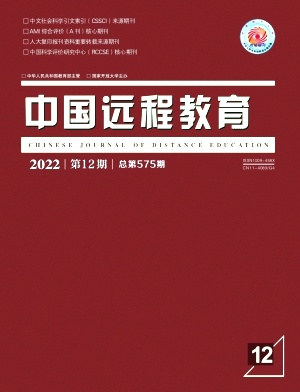
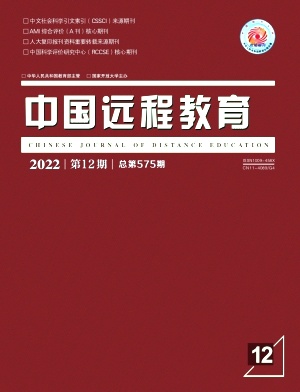
Contents
• Key research projects in education sciences in China in the 21st century: progress, trends and reflections
• A review of intercultural education
• Ethics of responsibility: posthuman objective of moral education in the information age
• Digital technology-enabled co-governance of rural and urban compulsory education: theoretical mechanism and realization pathways
• “Tenured migrant workers”: analyzing the viability of educational development at the county level from micro behaviors of would-be teachers for rural schools
• Towards a value-added assessment mode supported by intelligent technology
• Assessing critical thinking about real-world problems: status quo and challenges
• Educational assessment in the era of artificial intelligence: towards a universal theoretical framework and practice pathways
• Contents of Chinese Journal of Distance Education in 2022
、
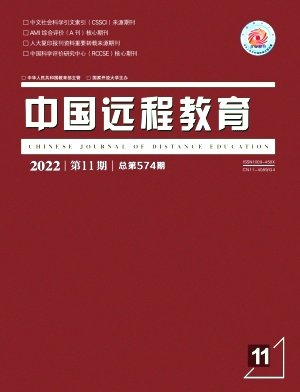
Contents
• Taking advantage of digital transformation affordances to construct the new ecology of smart education
• Different understandings and new interpretation of smart instruction
• The growth patterns and education pathways of contemporary university students
• The innovation and reform of education for the high-quality development of economy
• Towards a"four-dimension-In-one"community model of ideological and political education: the case of the Open University of China
• How to benchmark the quality of degree/diploma programmes in continuing education: historical debates and contemporary demands
• A survey of primary school science teachers’teaching practice and its influencing mechanism in 31 provinces in China
• Deep learning from the perspective of knowledge: connotation, barrier and pathway
• The impact of stratified teaching on vocational school students’ academic achievement : a meta-analysis of 42 Chinese experimental studies
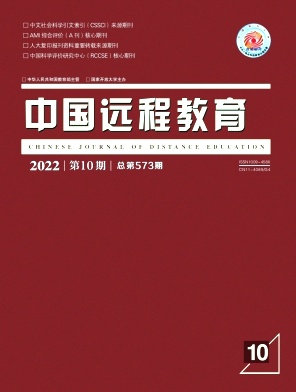
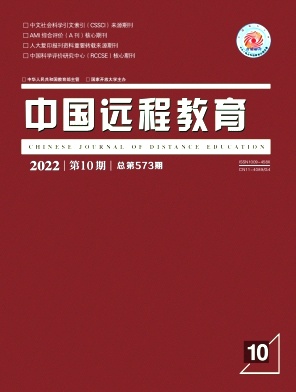
Contents
• Reflections on the view of knowledge in the Age of Artificial Intelligence
• Major findings and trends of digital intelligent decision making-oriented learning analytics research: a qualitative meta analysis of articles presented to LAK conferences (2011-2021)
• How can teachers survive in the age of artificial intelligence? A critical reflection
• Research trajectory of continuing education quality assurance in China: a visualization of CNKI literature
• External factors influencing the scale of open education enrollment
• Toward a future of co-learning and mutual learning: a knowledge map of contemporary intergenerational learning research
• Intergenerational learning: towards a framework of theoretical analysis
• A study of middle school students' behavioural characteristics and learning outcomes in online after-school services
• Abstracts
• Contents
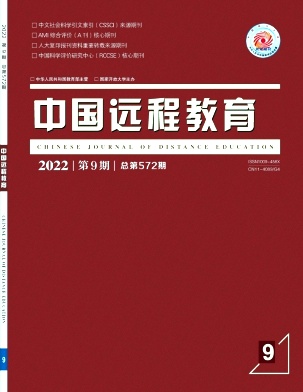
Contents
• Online teaching competence enhancement: understanding open university teachers' perception from the perspective of structuration theory
• Facilitating active aging in the new era: setting standards for constructing open universities for the elderly
• Multimodal data-enhanced research in education sciences: development trajectory and challenges
• STEM education: dilemma and reflection
• Core elements, problems and prospects of student innovation ability: a systematic review of publications in core Chinese journals
• Analyzing teaching characteristics and interaction patterns of STEM classroom from the perspective of multi-dimensional evaluation
• Performance assessment of STEM teachers' teaching competence: model construction and verification
• Towards constructing a social interaction network highlighting both quantity and quality: methodological innovation and verification
• Privacy protection for educational apps: evaluation indicator construction and the status quo in China
• Abstracts
• Contents
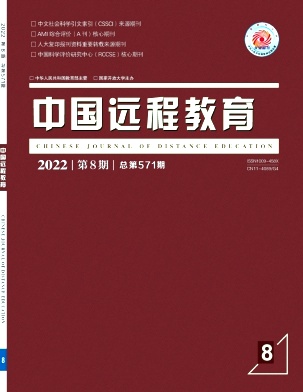
Contents
• Towards supply-side reform of professional development for basic education teacher in the digital age
• Future teacher education empowered by virtual reality: logic, scenario and reshaping
• Recognition and visualization of emotion in online peer feedback: promoting teachers’deep reflection and addressing teaching problems
• Towards a blended teaching competency model for university faculty based on TPACK
• "Dual Teaching" against the backdrop of balanced development: dilemma and solution
• Resolving the contradiction between large-scale education and personalized education: logical framework and practical approach to data-driven large-scale personalized teaching
• STEM education in rural areas: possibility, dilemma and solution
• Factors influencing high school students’digital literacy practices in online forums: multi-dimensional interaction between teachers and students
• Construction and application of digital representation model of learning engagement in collaborative learning
• Abstracts
• Contents
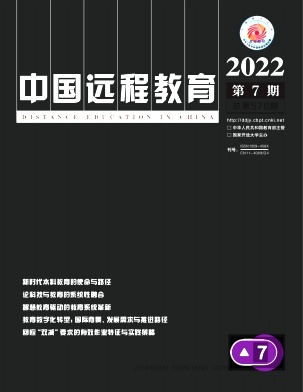
Contents
• Mission and pathways of undergraduate education in the new age
• Towards systematic integration of technology and education
• Smart education-driven innovation in education systems
• Digital transformation of education: international perspective, development needs and implementation strategy
• Assembling new toolboxes of methods and theories for innovative critical research on educational technologyeducational technology
• Reflections on lifelong education for global ethics
• Developing educational technology as a discipline against the backdrop of First-class Discipline Construction Initiative: challenges, opportunities and potential pathways
• Features of effective assignments and implementation strategy in response to the Double Reduction policy
• A dialectical approach to simplifying deeper learning research methodology
• Abstracts
• Contents
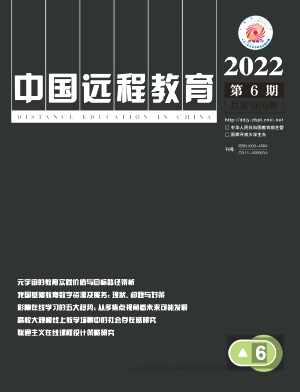

Contents
• Metaverse for education: practical value and development objectives
• China’s basic education digital resources and services: status quo, problems and solutions
• Five major trends shaping online learning: a multifocal view of possible futures
• Towards a measurement model of social presence in massive online teaching of higher education
• Exploring the interpretability of a student grade prediction model in blended courses
• International postgraduate online education: quality assurance and lessons
• Strategies for designing Connectivist online courses: building on five design iterations of a cMOOC
• Abstracts
• Contents
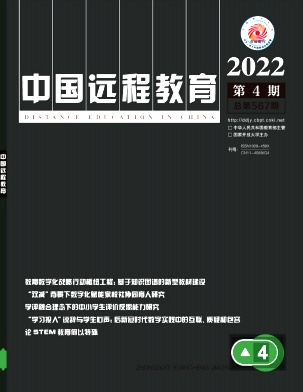
Contents
• Knowledge graph-based textbooks as a cornerstone of the digitalization strategy for education
• Digitally-empowered family-school-community collaboration in promoting student all-round development in the“Double Reduction”context
• Assessment for, as and of learning: a study of primary and secondary students’reflective assessment
• Off-campus training institution governance: against the backdrop of“Double Reduction”
• “Engagement”discourses and the student voice: connectedness, questioning and inclusion in post-Covid digital practices
• Why is STEM education so special?
• Cultivating teachers’design thinking in the intelligent age: logical perspectives and dilemma solutions
• China National Data Platform of Higher Education Quality Monitoring: current status and improvement suggestions
• Abstracts
• Contents
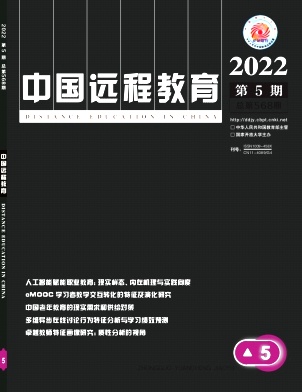
Contents
• AI-empowered vocational education: current state, internal mechanism and practice dimensions
• Skill formation and the transformation and development of vocational education in the intelligent age
• Transformation in cMOOC learner interactions: features and evolution
• Third-age education in China: measures to overcome supply shortages
• MOOC development in Europe: trends and implications
• Reviewing the micro-credential literature: more than just another passing educational fad?
• Multi-dimensional behavior characteristics analysis and academic performance prediction in asynchronous online discussion
• Profiling characteristics of an excellent teacher: towards a qualitative analysis
• Abstracts
• Contents
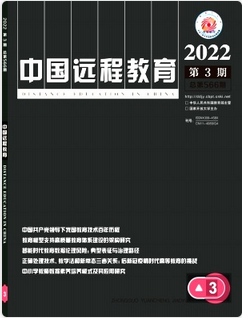
Contents
• One hundred years of educational technology development in China under the leadership of the Communist Party of China
• Towards a high-quality education system supported by educational modeling
• Ethical risks of educational data in the intelligent era: typical features and governance paths
• Balancing technology, pedagogy and the new normal: post-pandemic challenges for higher education
• Constructing a collaborative learning model from the perspective of learning space integration
• Towards a data literacy cultivation model for primary and middle school teachers
• Factors influencing online course users’sticky behaviors
• Designing and applying fraction game from the perspective of learning sciences
• Abstracts